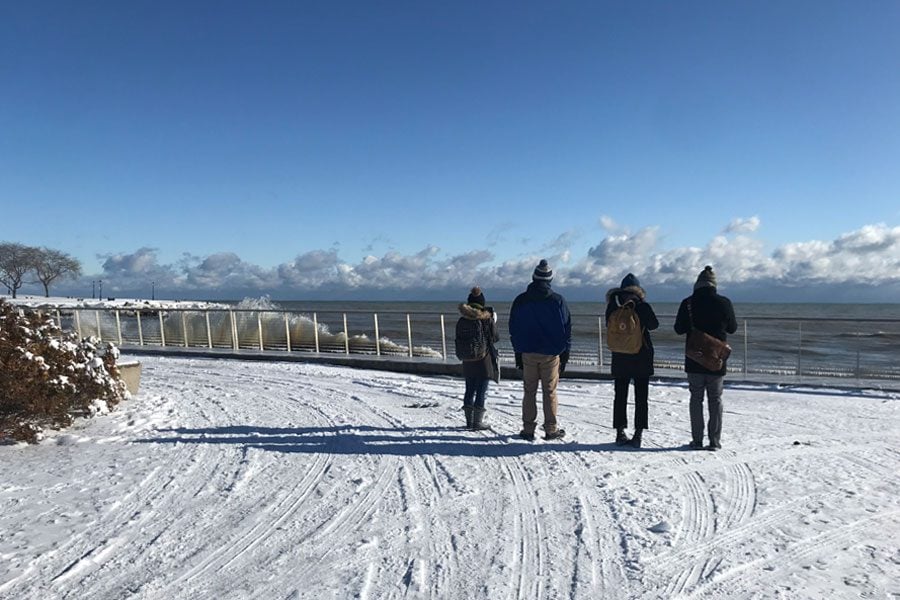Native community holds events in November for 30 Days of Indigenous programming
Daily file photo by Emma Yarger
Campus nature walk participants pause to appreciate the land and water where Northwestern was built. Northwestern lies on the lands of the Council of the Three Fires.
November 13, 2019
Graduate students Nikki McDaid-Morgan and Forrest Bruce gathered under Weber Arch Tuesday morning with a small group of Indigenous community members to take campus nature walks and appreciate the land where Northwestern was built.
This event was a part of the University’s 30 Days of Indigenous programming, a set of resources and activities throughout November organized to celebrate Native American History Month. Members of the Indigenous community said all students, faculty and staff are invited to participate in daily events or self-guided learning to engage with Indigenous history and communities.
McDaid-Morgan, a member of the Shoshone-Bannock Tribes, said the walk aimed to reconnect with land and waters by taking time to appreciate them. The walk began with land recognition and emphasized environmentalism through engagement with the Earth, she said.
“When people recognize the folks that this land is the traditional homelands of, that’s great, but it’s not enough,” McDaid-Morgan said.
Before the walk started, McDaid-Morgan shared a traditional story from the Shoshone-Bannock Tribes. She said when humans arrived to Earth, animals agreed to help them as long as they always live in harmony with land and waters.
The campus nature walks will also occur the next two Tuesdays of November.
Other events throughout the month include smudging ceremonies — the practice of burning sage for healing purposes. Upcoming craft circles will include making corn husk dolls and jewelry. Assistant Director of Multicultural Student Affairs Aaron Golding said events like last week’s beading craft circle are welcome to people of all experience levels and backgrounds.
“The opportunity to be able to just practice and learn was great,” Golding said. “It was really a great community, just rejuvenation time to come together and hang out.”
Jennifer Michals, the program assistant for the Center for Native American and Indigenous Research, said the main goal of 30 Days of Indigenous programming is to spread awareness about Indigenous history to a broader audience.
“Illinois doesn’t really teach about Native Americans,” Michals said. “It’s not a mandated part of their curriculum, so having resources that was created by Native and Indigenous folks is really important that we are able to share our knowledge and our voices.”
The Office of Native American Indigenous research, the Office of Institutional Diversity and Inclusion and Multicultural Student Affairs worked together to create the calendar of events for November, which can be found on MSA’s website.
Upcoming events include a commemoration for the Sand Creek Massacre on Saturday, an existing tradition at NU that creators incorporated into 30 Days of Indigenous.
Golding said the calendar of events increases visibility of Native peoples on campus and in the larger community.
“It’s commonly thought of that Native Americans are relegated to the past or something like that, but we’re here,” Golding said. “We sit next to you in class.”
Michals said supporting Native American and Indigenous initiatives shouldn’t stop when November comes to an end. She said although they use November as a chance to celebrate, Native people are tasked with representing Indigenous communities to the public throughout the year.
“Our native community gets really overtaxed and overworked in sharing information,” Michals said. “After this month is over, we would still like to cultivate our relationships with community members and students.”
Email: emmayarger2023@u.northwestern.edu
Twitter: @emmayarger



